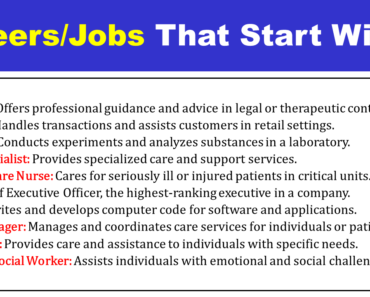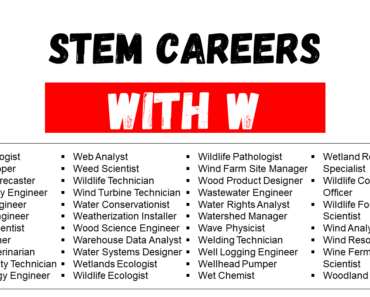As we advance to ‘E’ in our exploration of STEM careers, we uncover a range of engaging and essential professions. These careers blend science, technology, engineering, and mathematics, each contributing uniquely to their fields. Explore the careers that start with ‘E’, each described briefly to highlight their roles and impact.
STEM Careers That Start With E
Here are STEM careers that start with the letter ‘e’:
- Electrical Engineer: Design, develop, and test electrical devices and equipment.
- Environmental Scientist: Study and solve environmental problems.
- Epidemiologist: Study the patterns and causes of diseases in populations.
- Ecologist: Study ecosystems and the relationships between organisms and their environment.
- Endocrinologist: Treat disorders of the endocrine system, including hormones.
- Entomologist: Study insects and their impact on the environment and human health.
- Ethologist: Study animal behavior under natural conditions.
- Earth Scientist: Study the physical aspects of the Earth.
- Electromechanical Technician: Combine knowledge of mechanical technology with electrical and electronic circuits.
- Electrochemist: Study chemical processes involving electricity.
- Electron Microscopist: Use electron microscopes to study materials at the micro or nano scale.
- Embryologist: Study the development of embryos from fertilization to birth.
- Emergency Management Specialist: Plan and coordinate responses to emergencies and disasters.
- Energy Auditor: Assess energy use and recommend improvements.
- Energy Engineer: Design and develop systems for energy production and efficiency.
- Engineering Technician: Assist engineers in designing and developing products, tools, and processes.
- Environmental Chemist: Study and solve environmental problems using chemistry.
- Environmental Consultant: Provide advice on environmental management and compliance.
- Environmental Engineer: Develop solutions to environmental problems.
- Environmental Health Specialist: Focus on preventing and controlling environmental health hazards.
- Environmental Planner: Plan and develop strategies for sustainable environmental development.
- Enzymologist: Study enzymes and their biochemical processes.
- Ecosystem Scientist: Study complex interactions within ecosystems.
- Economic Geologist: Explore and evaluate mineral deposits and geological resources.
- Educational Psychologist: Study how people learn and retain knowledge.
- Electrical Systems Designer: Design electrical systems for buildings and infrastructure.
- Electrophysiologist: Study the electrical properties of biological cells and tissues.
- Electronic Warfare Specialist: Manage and operate electronic warfare equipment.
- Electronics Engineer: Design and develop electronic equipment.
- Electrophoresis Technician: Perform electrophoresis for separating molecules.
- Elementary Particle Physicist: Study the fundamental particles and forces of nature.
- Embedded Systems Engineer: Develop embedded systems for electronic products.
- Emergency Medical Technician: Provide emergency medical services and patient care.
- Emissions Control Engineer: Develop ways to reduce and control emissions.
- Endangered Species Biologist: Study and protect endangered species and their habitats.
- Energy Analyst: Analyze energy data and efficiency.
- Energy Policy Analyst: Develop and analyze policies related to energy.
- Engineering Geologist: Apply geological knowledge in engineering works.
- Engineering Manager: Oversee engineering projects and teams.
- Engineering Physicist: Apply physics in solving engineering problems.
- Environmental Biologist: Study biological factors in the environment.
- Environmental Epidemiologist: Study the relationship between environment and disease.
- Environmental Informatics Specialist: Apply informatics to environmental data and issues.
- Environmental Microbiologist: Study microorganisms in the environment.
- Environmental Restoration Planner: Plan projects to restore natural habitats.
- Epidemiological Modeler: Create models to predict disease spread.
- Ergonomist: Design products and systems for optimal human use and safety.
- Estuarine Scientist: Study estuarine (where river meets sea) ecosystems.
- Evolutionary Biologist: Study the evolutionary processes that produce biological diversity.
- Experimental Physicist: Conduct experiments to study physical phenomena.
Explore STEM Career A-Z:
A – B – C – D – E – F – G – H – I – J – K – L – M – N – O – P – Q – R – S – T – U – V – W – X – Y – Z







